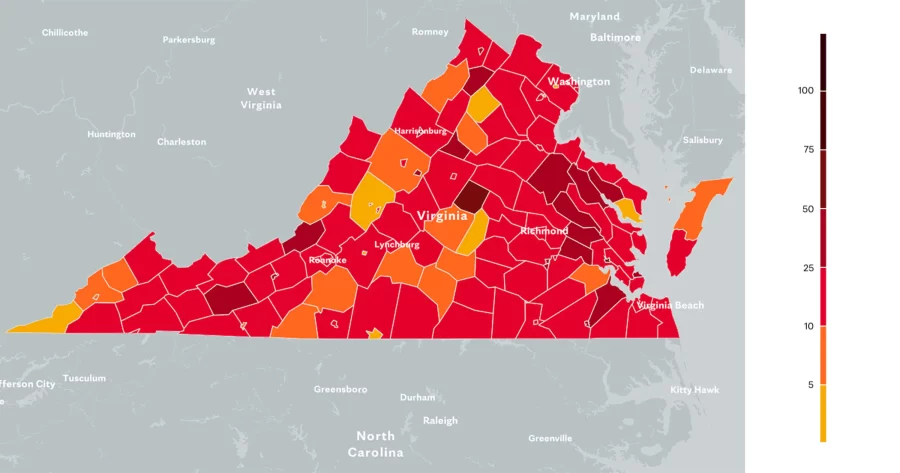Omicron variant rampages the U.S.
February 15, 2022
The new and highly infectious Omicron variant of COVID-19, first detected in November 2021 in Botswana and South Africa and first recorded in the U.S. in December, has spread rapidly over the past several months, threatening both health and economic conditions around the world. This variant is more easily transmitted than the original SARS-CoV-2 virus or the Delta variant, and the Centers for Disease Control and Prevention (CDC) has said that although vaccinated individuals are less likely to transmit the virus than those who are unvaccinated, anyone can spread it.
Common Omicron symptoms for vaccinated individuals include coughing, fatigue, congestion, sore throat, headache, and loss of taste and smell, but this knowledge is mainly based on observed patient experiences as the variant is still too new for scientists to have fully examined its effects. However, it has been proven that vaccines and the booster shot are highly effective in reducing the risk of infection and lessening intensity of symptoms.
“Data from South Africa and the United Kingdom demonstrate that vaccine effectiveness against infection for two doses of an mRNA vaccine is approximately 35%,” the CDC said. “A COVID-19 vaccine booster dose restores vaccine effectiveness against infection to 75%.”
Additionally, data released from a health insurance company in South Africa showed that although highly contagious, Omicron’s effects are notably less severe than those of Delta. It is also less likely to cause long-term loss of taste and smell, however scientists are not sure whether that is due to the presence of a vaccine or not. Like Delta, Omicron is more likely to be extreme in unvaccinated people.
Due to the vaccine’s ability to reduce hospitalizations and deaths, public health officials recommend that everyone who is eligible receive two doses and the booster. Everyone five years and older can receive the first two shots, and people 12 and older can get the Pfizer booster. Patients looking to receive the Moderna or Johnson & Johnson booster must wait until they are 18.
“The risk of severe disease from any circulating variant, including Omicron is much, much higher for the unvaccinated,” Dr. Anthony Fauci, President Joe Biden’s Chief Medical Advisor said. “Adults and children who are eligible, get vaccinated, and vaccinated people, get boosted when eligible.”
In addition to vaccines and boosters, nations are continuing to work on other methods to mitigate the spread of COVID. Biden has long touted the importance of testing for coronavirus, and his administration has created a website, COVIDTests.gov, where each American household can order four free at-home test kits. They believe that this is critical for detecting coronavirus, especially considering the shortage of rapid tests in the U.S.
“Testing unequivocally saves lives, and widespread testing is the key to opening up our economy again,” Biden said in 2020.
Biden is also working on mask availability to further combat the spread of COVID. His administration is hoping to distribute 400 million masks through pharmacies and health centers in a program that should be ready by early February. This initiative would allow Americans to receive three free N95 masks, which provide more protection than typical cloth or surgical masks.
Masks are an “important tool to stop the spread, especially of the highly transmittable Omicron variant,” Biden said. “So, please, please wear the mask.”
Despite the federal government urging Americans to remain cautious about COVID, newly-elected Virginia Governor Glenn Youngkin has taken a different approach. On his first day in office, Youngkin signed an executive order stating that school districts cannot require their students to wear masks, explaining that mask mandates infringe upon personal freedom. Several districts, including Fairfax County, have pushed back on this executive order and are continuing with the policy of universal masking in schools. This issue will likely make its way through the court system, and Virginia students may have to wait for a definitive answer on mask policies.
In addition to school districts, public officials and others have criticized Youngkin for signing this executive order in the midst of such a severe spike in cases. The U.S. has recorded a total of over 75 million coronavirus cases, and there have been almost 1.6 million cases in Virginia alone. The vast majority of cases in the U.S. right now are Omicron, and this trend is expected to continue at least until this variant has reached its peak, likely in late January or early February.
By February or March, Omicron will hopefully be kept at a low enough level so “it doesn’t disrupt our society, our economy, our way of life,” Fauci said.
Despite the high number of Omicron cases and the challenges it has posed for education, 65.8% of Madison students still believe that schools should continue to provide in-person learning. Many individuals believe that the Coronavirus will continue to be present in life but that education and life in general need to return to normal, especially since Omicron cases are expected to decline in the coming months. Others are concerned with moving too rapidly toward an old normal that is no longer possible.
“There’s so much uncertainty about our new normal, but it’s as clear as day that, in order to ensure our safety in it, we need to make a conscious effort,” Layla Hasanzadah (‘22) said. “Keeping your mask on the bridge of your nose is the least we can do to prevent further outbreaks.”



